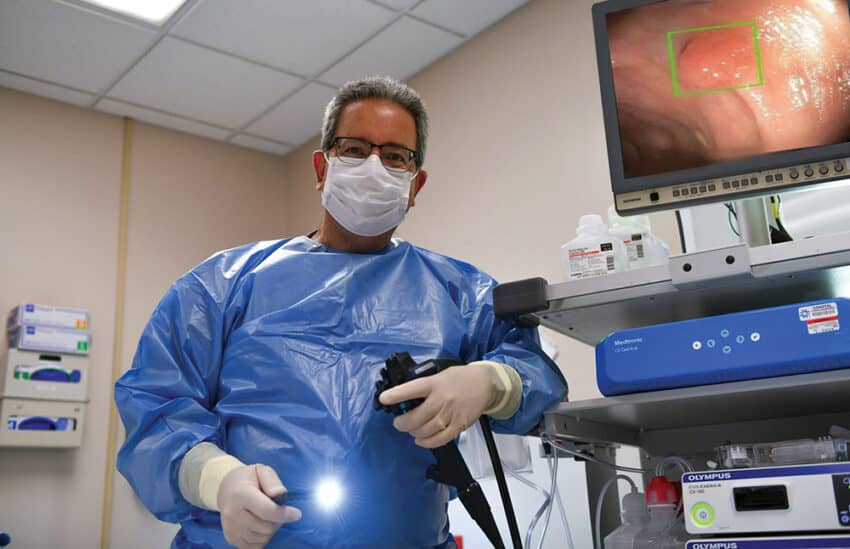Only hospital in New Jersey to offer GI Genius™ intelligent endoscopy modules through Medtronic Health Equity Assistance Program, supported by American Society for Gastrointestinal Endoscopy (ASGE) and Amazon Web Services (AWS)
Press Release
NEW JERSEY – Hackensack University Medical Center is the only hospital in New Jersey – and the first in the tri-state area – to receive a grant to provide the Medtronic GI Genius™ artificial intelligence (AI)-assisted colonoscopy technology to low-income and underserved communities. The $500,000 grant, awarded by the Medtronic Health Equity Assistance Program, with support from the American Society for Gastrointestinal Endoscopy (ASGE) and Amazon Web Services (AWS), will fund the installation of three GI Genius modules in the Outpatient Endoscopy and Surgery Department, plus training and ongoing support.
“Hackensack Meridian Health is deeply committed to ensuring that all New Jersey residents have access to high quality, innovative care, regardless of who you are or where you live,’’ said Robert C. Garrett, FACHE, CEO, Hackensack Meridian Health. “We will continue to innovate health care and work diligently to eliminate unacceptable gaps in outcomes based on race, ethnicity and socioeconomic status.’’
The GI Genius intelligent endoscopy module, authorized by the FDA in April 2021 uses computer-aided detection algorithms to identify colorectal polyps of varying shapes and sizes in real time, facilitating the diagnosis and prevention of colorectal cancer, the second leading cause of cancer-related death in the U.S.
Hackensack University Medical Center will receive three of the 50 GI Genius modules to be donated to endoscopy centers nationwide by the Medtronic Health Equity Assistance Program, which aims to increase screening, early detection, and diagnosis of colorectal cancer (CRC) in underserved communities who benefit from this type of cutting-edge technology that is often not available to them. As the centerpiece of the program, GI Genius has demonstrated ability to improve detection of colorectal polyps that can lead to CRC.
“Currently, colorectal cancer is the third deadliest cancer and one of the most common among adults in the United States,” said Mark D. Sparta, FACHE, President & Chief Hospital Executive, Hackensack University Medical Center and President, North Region, Hackensack Meridian Health. “Hackensack University Medical strives to provide the most cutting-edge screenings and treatments for our patients, including this new program that uses artificial intelligence to improve the early detection of polyps or colorectal cancers – ultimately decreasing colorectal cancer mortality rates.”
“For communities that historically have not availed themselves of colorectal cancer screening, the availability of GI Genius is a game-changer,” commented Rosario Ligresti, MD, FASGE, chief of the Division of Gastroenterology at Hackensack University Medical Center. “It’s a real door-opener not only to colonoscopy, but to high-quality colonoscopy. GI Genius is a major advance because of its ability to detect smaller and earlier precursor lesions in the colon, thereby enabling the removal of these lesions before they become cancerous. Moreover, with its AI-driven precision technology, GI Genius eliminates much of the variability between colonoscopists in detecting adenomas.”
At the discretion of their doctor, any patient having a screening colonoscopy can be screened with the assistance of GI Genius at no extra cost and the procedure is covered by all insurances. Patients with a history of polyps; younger patients and patients with a history of inflammatory bowel disease are likely to benefit most from the increased precision of the test.
Approved by the United States Food and Drug Administration (FDA) in April 2021, the GI Genius intelligent endoscopy module is the first-to-market, computer-driven, AI-powered colorectal polyp detection system. In a 2020 prospective, randomized study, the addition of GI Genius to high-definition (HD) colonoscopy increased the absolute adenoma detection rate (ADR) by 14.4%, compared to HD colonoscopy alone, representing a 30% relative increase in ADR. For every 1% increase in ADR, patients’ risk of CRC decreases by 3%. In the 2020 study, GI Genius was also 50% more likely to detect multiple polyps and 53% more likely to detect polyps in the distal colon (the last part of the colon), compared to HD colonoscopy alone.2
More recently, in a multi-center, international study in which participants underwent two same-day, back-to-back colonoscopies with or without GI Genius, use of GI Genius resulted in an approximately two-fold reduction in the adenoma miss rate (AMR), mainly due to a decreased miss rate of flat and small lesions. The investigators commented that “computer-aided detection reassures health care providers and patients on the decreased risk of perceptual errors.”
“GI Genius not only detects more lesions than a colonoscopist would normally see, it also detects more clinically relevant lesions, and it does so without adding any extra complexity, time, or effort to a conventional colonoscopy exam,” Dr. Ligresti noted. “By offering this cutting-edge technology to populations long underserved by the health care system, we have the potential to greatly improve upon the 5,000 colorectal cancer screening procedures we perform annually at Hackensack University Medical Center. If we can double or even triple the procedure rate, we can potentially impact as many as 15,000 lives through earlier detection and prevention, which would be a tremendous benefit to the community.”





